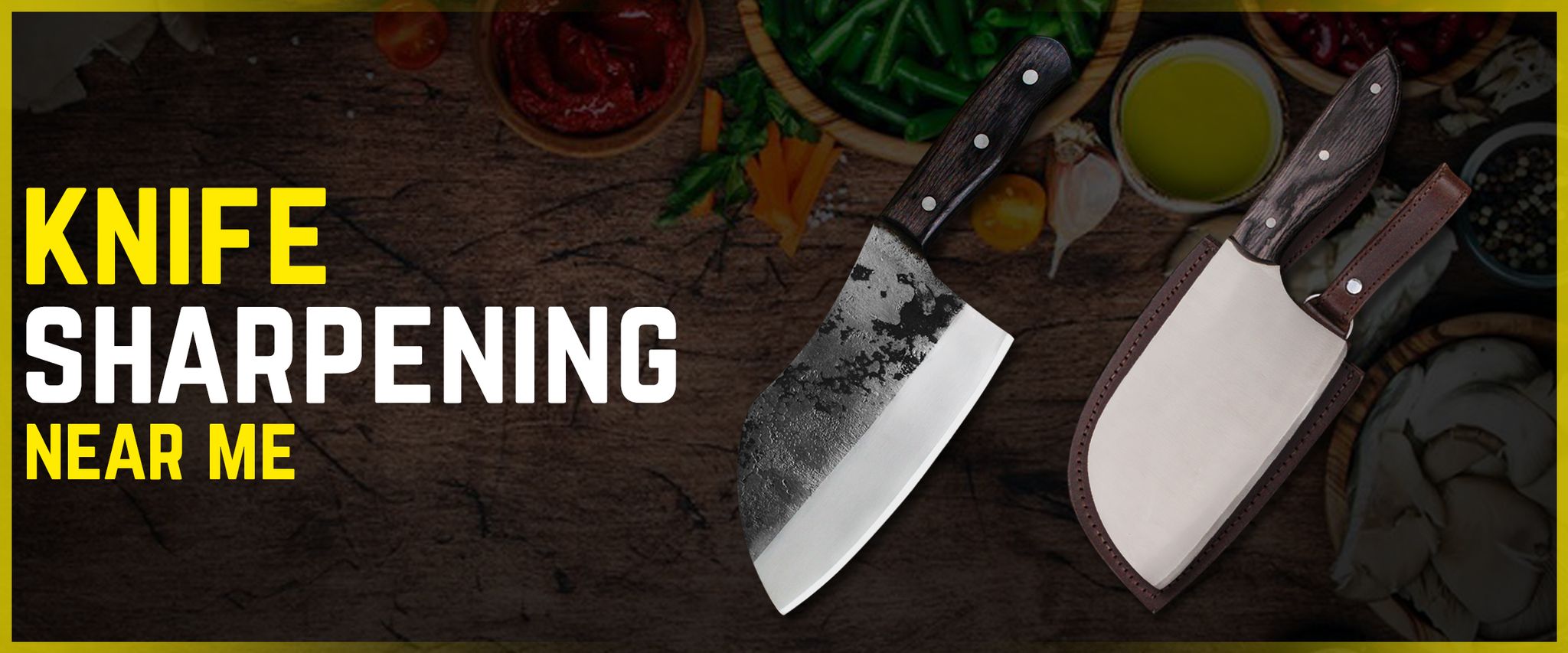Expert Knife Sharpening Near Me for Precision Cutting
Are you looking for a local professional knife sharpening service? Look nowhere else! Your dull blades will be optimally sharpened by our skilled knife sharpening professionals. By employing convenient locations and top-notch sharpening techniques, we guarantee that your knives regain their perfect cutting edge. Utilize our “knife sharpening near me” service for convenience, and benefit from the effectiveness and satisfaction of utilizing durable, sharp knives in your kitchen.
Introduction:
The importance of a sharp knife in the world of culinary prowess cannot be emphasized. Whether you’re an experienced home cook or a trained chef, the skill of precision cutting hinges on the quality of your blades. Even the best knives eventually lose their edge, which makes using them in the kitchen frustrating. Here is when professional knife sharpening services are useful. In this comprehensive article, we delve deep into the realm of knife sharpening and discuss the challenges of finding “Expert Knife Sharpening Near Me for Precision Cutting.” By the end, you’ll be equipped with the knowledge necessary to locate and utilize these crucial services.
1. Understanding the Importance of Sharp Knives
Just picture yourself quickly and easily slicing through a ripe tomato. That is the sign of a well-honed knife. Sharp blades not only make cooking more enjoyable, but they also promote safety by reducing the possibility of accidents brought on by unintentional slips. When your knives are kept operating at their top, precision cutting becomes second nature, enabling consistent and appealing results.
2. The Science Behind Dull Blades
Knives eventually lose sharpness as you use them through friction with cutting boards, plates, and food. Your edge will eventually get dull as a result, which will not only decrease your efficiency but also cause more harm than good. Cutting through objects with a dull knife needs more force, which raises the possibility of slips and uneven cuts. Furthermore, delicate materials may be crushed by dull edges as opposed to being cleanly sliced through, which can change the texture and appearance of your food.
3. Enter Expert Knife Sharpening Services
Knife sharpening services performed by professionals are the only way to save your prized knives and restore them to their former splendor. These professionals have in-depth knowledge of blade geometry and sharpening techniques. They use precise tools and techniques to reestablish the correct angle of the blade edge, sharpening it to a point that guarantees the best cutting performance.
4. The Art of Precision Knife Sharpening
Knife sharpening needs a fine balance between removing just enough material to make the blade sharp again and maintaining the knife’s structural integrity. In order to further refine the edge, skilled sharpeners frequently use a multi-step procedure that includes coarse and fine abrasives as well as honing on finer grits. The finished product is a blade that demands minimal effort from you and effortlessly slices into food.
5. Finding the Right “Knife Sharpening Near Me”
It is impossible to exaggerate how useful it is to have a trustworthy knife sharpening service close by. You may probably find a list of nearby companies that provide these services by conducting a fast online search for “knife sharpening near me”. Look for testimonials and recommendations from former clients to get an idea of the quality of their work. Ask them about their processes and the anticipated turnaround time for your sharpened knives, as well.
6. Choosing the Right Knife Sharpening Technique
Knives cannot be sharpened in a way that is universal. Chef’s knives, paring knives, and serrated knives all need to be sharpened using different techniques. Professional sharpening service providers are familiar with these techniques and can ensure that each knife is handled correctly.
Knives with Straight Edges: Traditionally, paring knives and chef’s knives have straight edges. The angle and sharpness of the blade are restored by skilled sharpeners using a mix of sharpening stones and abrasive belts. The technique requires delicately gliding the knife across the abrasive surface while holding it at a specific angle.
Serrated Knives: Serrated knives have a serrated edge that needs special honing and is frequently used for slicing bread and delicate fruits. Each serration is manually sharpened by professionals using tapered or round files, restoring the knife’s capacity to slice through food neatly and without ripping.
Honing vs. Sharpening: While honing, which is frequently done with an honing rod or steel, realigns the edge of the blade between sharpening sessions, sharpening removes material to regenerate the edge. You can maintain your blades’ consistency of sharpness between sharpenings by routinely honing.
7. The Importance of Location
When looking for knife sharpening services, access is crucial. Having a provider close by can save you time and work, increasing the likelihood that you’ll give maintaining the sharpness of your knives priority. A nearby provider may additionally provide drop-off and pick-up choices, guaranteeing a seamless encounter.
8. Frequency of Sharpening
You should periodically sharpen your knives, depending on how frequently you use them. Due to the high rate of cutting, professional kitchens may require more frequent sharpening. A decent general rule of thumb for the typical home cook is to sharpen their knives every three to six months. The knife’s performance, though, is the greatest predictor; if it’s having trouble cutting cleanly, it needs to be sharpened.
9. Caring for Your Sharpened Knives
Once your knives have been professionally sharpened, maintaining their edge requires proper maintenance. Cutting on hard surfaces like glass or stone should be avoided because doing so will soon dull the blade. Cutting boards made of wood or plastic are kinder to the edge. Knives that have been hand-washed and dried quickly are more resistant to rust and damage.
10. Cost Considerations
Depending on the region and the kind of knives being sharpened, professional knife sharpening services cost vary. Despite the expense, it is an investment in the functionality and longevity of your knives. Knives that have been properly sharpened not only make cooking more fun, but they can also help you save money by delaying the need to replace them.
Conclusion or other details
In the world of culinary talent, having sharp knives that smoothly glide through food is essential for precision cutting. The transformation from blunt to sharp is profound, and “Expert Knife Sharpening Near Me for Precision Cutting” is the link to this level of culinary expertise. The importance of having sharp knives in the kitchen cannot be overstated because they enhance not just your cooking experience but also the quality and safety of your food. A symphony of techniques and instruments are used by professional knife sharpening firms, staffed by expert artists of blade restoration, to give your cherished blades a new lease on life. They carefully and precisely recreate the ideal cutting edge by taking into account the geometry of each blade. These professionals are the keepers of culinary artistry, ensuring that each chop, slice, and dice is proof of the expert application of a sharp blade.
GET FREE UPDATES
FAQs
How often you use knives will influence how often they need to be sharpened by a professional. Sharpening is recommended for devoted home cooks every three to six months. The best indicator, though, is the blade’s sharpness; if cutting gets more challenging, it’s time for sharpening.
Although there are DIY sharpening equipment available, professional sharpening offers unmatched precision and experience. Inadequate sharpening techniques can damage knives by producing uneven edges and removing too much material.
Yes, different knife types need different sharpening methods. In contrast to serrated blades, straight-edge knives, like chef’s knives, call for different techniques. Experienced sharpeners, who can ensure that each knife is handled correctly, are familiar with these techniques.
Check internet reviews and customer testimonials to gauge the quality of neighboring knife sharpening shops. Confirm that they have a strong track record of maintaining the integrity of knives while they are being sharpened by asking them about their procedures and turnaround times.
Your knives’ lifespan shouldn’t be greatly shortened by professional sharpening that is done correctly, carefully, and precisely. In fact, regular honing can lengthen the life of your knives by lowering the need for aggressive sharpening methods.
You can indeed use your knives right away after having them sharpened. It’s a good idea to wash and dry them before use to get rid of any metal shavings or other waste items left over from the sharpening procedure.
Sharpening can fix small chips or nicks, but more serious damage might need more involved repairs. To make a decision, it is best to ask a skilled sharpener for guidance.
Between sharpening sessions, honing is a maintenance method that realigns the blade’s edge. Unlike sharpening, it doesn’t remove material, yet it still aids in keeping the edge’s sharpness. For this purpose, honing rods or steels are frequently utilized.
Serrated knives are more difficult to sharpen at home since they require specialist equipment and methods. To ensure that their complicated edges are properly maintained, serrated knives should be sharpened by a specialist.
Absolutely. An investment in the durability and effectiveness of your blades is professional knife sharpening. Knives that have been properly sharpened not only make cooking more enjoyable, but they also end up saving you money over time by preventing needless knife replacement.
Why Choose Us!







